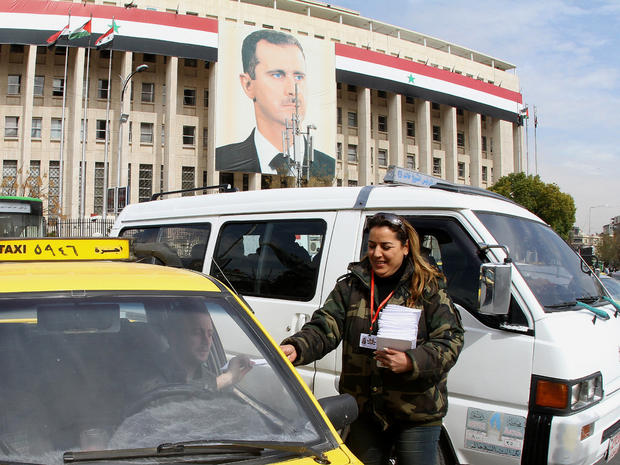Syria set for blood-stained referendum
Syrians will vote next in a nationwide "yes or no" referendum on a new draft constitution that could effectively end five decades of single-party rule, but the opposition is calling on Syrians to boycott the plebiscite and there is little hope from the international community that it can bring peace.
More than 14 million eligible voters from Syria's total population of 24 million are invited to cast their ballots at 835 polling stations across the nation.
The polls are set to open at 7 a.m. on Sunday, but after almost a year of intense violence and bloodshed across the country, it's hard to see how such an unprecedented ballot could possibly be carried out effectively on the given timescale.
"Friends of Syria" meet as Assad pummels Homs
Russia, China reject "interference" in Syria
U.N.: Syria atrocities ordered from "highest level"
The 157-article proposed charter would drop Article 8 of the Syrian constitution, which declares President Bashar Assad's ruling Ba'ath Party the "leader of the state and society".
Under the new constitution, authored by a 29-member Constitutional Committee, other parties would have the "right" to name their own candidates for the presidency, which would be set at a maximum of two consecutive seven-year terms.
Assad has been in power for 12 years, succeeding his father, who ruled for 30 years. The Ba'ath Party has ruled Syria since 1963.
Complete coverage: The Arab Spring
Under the new constitution, freedom would be "a sacred right" and "the people will govern the people" in a multi-party democracy, according to the draft.
Article 3 of the new draft, however, states that the president of Syria must be a Muslim over 40 years of age - a prime flaw that independents in the Constitutional Committee couldn't manage to get removed.
While Christians and secular Muslims did raise red flags over the clause, they haven't said they will boycott the referendum.
Maronite Father Toni Dora called article 3 a "grave sin" and a "stab in the back" of all Christians, who he says are treated in the new constitution as "second nationals" or "inferior citizens."
Sami Moubayed, a political analyst, shared that view.
"It is inconceivable that a Muslim Kurd can run for the presidency, whereas a Christian Arab cannot," he said, acknowledging that Christians were unlikely to win, since they only make up 12 percent of Syria's population.
"It is unlikely that the majority of Muslim voters would vote for a Christian," he said, adding, however that "if they did, then this would mean that such a candidate, acceptable to both Muslims and Christians, would certainly be qualified to become president."
Opposition leaders have entirely rejected the Assad regime's plan to hold the referendum on the new draft constitution, which is to be followed by multi-party elections within 90 days, according to the government's plan.
Amendments to Syria's constitution were a key demand by the opposition at the beginning of the country's uprising against the Assad regime, but in the wake of the military's deadly assault on dissents and the fierce bombardment of Homs, opposition leaders are now demanding nothing less than President Assad's departure.
"The regime is using this proposal to cover up for its massacres. A constitution cannot be prepared unless all political powers and societal groups in Syria participate in drafting it through an elected assembly," the opposition Local Coordination Committees umbrella group said in a statement.
At least 16 people were killed across Syria on Thursday, according to opposition activists, with one group putting the death toll at 90 with attacks ranging from mountain villages to areas near the capital of Damascus.
The most intense offensive, however, remained on Homs, Syria's third-largest city.
The unrest began in March with mostly peaceful protests against the authoritarian regime. But the conflict has escalated in recent months into an open conflict between rebel forces - many of them defectors - and Assad's state security forces.
Many observers warn the nation may be heading toward all out civil war.
The United Nations estimated the death toll from the unrest at 5,400 in 2011 alone. The global body stopped updating that figure in 2012, however, as escalating violence and the government's ban on independent reporting made it difficult to obtain accurate information.

